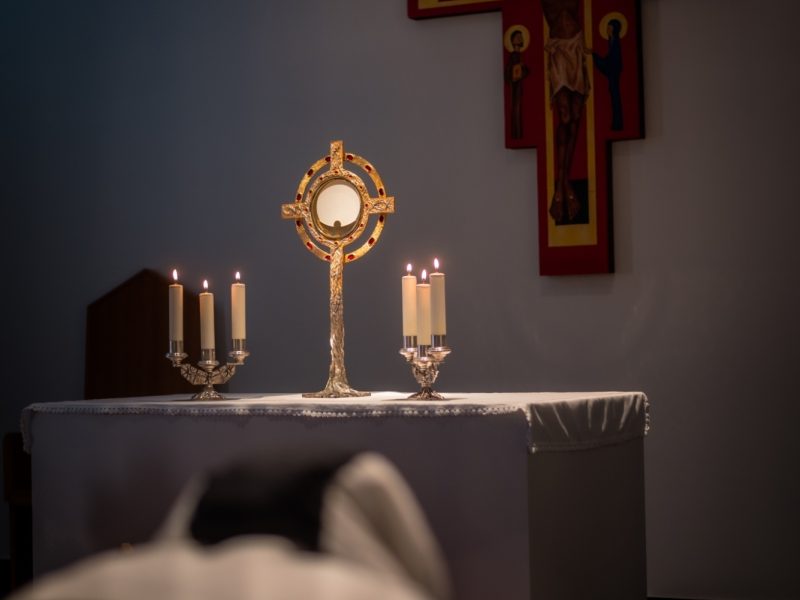From our Bishop - September 2024
Dear Brothers and Sisters in Christ
It was with profound joy and deep peace that I announced on 4 August our new cathedral would be named The Cathedral of the Blessed Sacrament – Te Hāhi Matua o te Hākarameta Tapu Rawa.
There were three main reasons I was led to choose this patronal name: The deep affection expressed by the people of
the diocese for the patronal name of the Blessed Sacrament; the fact every church built on the sacred ground of Barbadoes Street, going back to 1864, was named after the Blessed Sacrament; and the association of our Perpetual Adoration chapel with the new cathedral.
Not only have people throughout the diocese – and even further afield – expressed their joy at the decision, but we also received an unexpected blessing on the day of the announcement.
The Gospel that Sunday centred on the Eucharistic Discourse in John 6, a Gospel series we only hear from every three years, where Jesus introduces his disciples to the profound mystery of Eucharist. That Sunday, Jesus stated “I am the bread of life,” a mystery the Church has celebrated and revered from that time on.
Sunday 4 August was also the feast of St John Vianney, a priest who had a deep devotion to the Blessed Sacrament. He once stated “there is nothing so great
as the Blessed Sacrament. If God had something more precious, He would have given it to us.”
Having chosen our patronal name, we now have a challenge, and a responsibility, to honour our patron, to live up to the name. We are called to celebrate and honour the Blessed Sacrament in as worthy a manner as did the generations who passed it on to us. In this spirit it is important to reflect again on this great sacrament.

The Blessed Sacrament is the source and summit of our Catholic faith.
The phrase “source and summit of the Christian life” is drawn from the teachings of the Second Vatican Council, particularly from the document Lumen Gentium, which emphasises the centrality of the Eucharist in the life of the Church and its members.
Let’s break down this concept further.
1. The Eucharist as the Source and foundation of spiritual life
The Eucharist is considered the “source” because it is the wellspring from which all the Church’s spiritual life and activities flow. In the celebration of the Eucharist, we believe we encounter Christ in the most intimate way possible on earth. This encounter nourishes the soul, provides grace and strengthens us to live out our faith in daily life. It further offers unity with Christ and the Church. Through participation in the Eucharist, Catholics are united with Christ, who is the head of the Church, and with one another as members
of His Body. This union with Christ empowers us to live out our Christian vocation, whether in family life, work, or service to others. The Eucharist thus becomes the foundation for Christian living, offering spiritual strength and guidance. It is also a source of unique grace, seen as a primary channel of God’s grace.
Through the reception of the Blessed Sacrament, we receive the grace necessary to persevere in our faith, grow in holiness and overcome sin. The sacrament imparts sanctifying grace, which sustains and deepens our relationship with God.
2. The Eucharist as the Summit
The Eucharist is the “summit” because it is the highest and most perfect act of worship that the Church can offer to God. In the Mass, the sacrifice of Christ on the cross is made present, and the Church joins in offering this perfect sacrifice to the Father. This act of worship reaches its peak in the Eucharist, surpassing all other forms of prayer and devotion.
As the summit, it offers us a foretaste of heaven, an invitation to the heavenly banquet, where believers hope to be united with God forever. It is a glimpse of the eternal communion with God that awaits us in heaven. As such, the Eucharist is the culmination of the Christian journey, pointing us toward their ultimate goal. As the highpoint of our sacramental life, the Eucharist orientates all other sacraments.
Baptism, Confirmation and the sacrament of Reconciliation prepare believers to receive the Eucharist worthily, while the Anointing of the Sick and Holy Orders derive their spiritual efficacy from it. The Eucharist, therefore, sits at the peak of the sacramental life of the Church.
3. Source of Evangelisation and Mission
The strength and grace received from the Eucharist propel us to engage in the Church’s mission of evangelisation, service and charity. The nourishment from the Eucharist equips us to spread the Gospel and serve others in love, embodying the teachings of Christ in the world. The Great Commission to evangelisation and mission is nourished by the Eucharist. Every Mass is a re-presentation of Christ’s sacrifice, and the communal celebration of the Eucharist is the Church’s most significant and solemn gathering. It is in the Eucharistic celebration that the Church fully manifests itself as the Body of Christ.
In summary, when the Church teaches that the Eucharist is the “source and summit of the Christian life”, it is emphasising that all aspects of the Christian life and the Church’s activities are rooted in and directed toward
the Eucharist. The Eucharist is both the beginning point and the ultimate goal of the Church’s life and mission, encompassing the full expression of faith, worship and the communion of believers with Christ and one another.
Here are four ways we can deepen our love and devotion for the Blessed Sacrament.
1. Prepare well for Mass. Read the Sunday readings ahead of time; ask the Lord to prepare your heart to receive Him well in the Blessed Sacrament; arrive early to Mass allowing time
to prepare well for full and active participation. Preparation also includes preparing our souls through attendance at the sacrament of Reconciliation.
2. Make regular visits to the Blessed Sacrament in your parish or the closest chapel. A simple visit reminds us of the awesome gift
of the Eucharist, a presence that strengthens, heals and comforts.
3. Pray and reflect on the Eucharistic Discourse – Chapter 6 of John’s Gospel.
4. Participate in Eucharistic Adoration. Attend parish hours of Adoration;
visit the Blessed Sacrament chapel
at St Gregory’s, 26 Cotswold Ave; if possible, sign up for regular Adoration.

The joy of that recent announcement is in stark contrast to the final report of the Royal Commission of Inquiry into Abuse in Care. Catholic leaders asked for the Church to be included in the Commission’s scope. That was done because we wished to contribute to and learn from an inquiry of this importance and depth. It laid bare our shameful history, but with the hope our involvement would effect meaningful change.
In recent decades, the Catholic Church – including our Diocese of Christchurch – has made significant progress in responding to abuse and in establishing robust systems and processes. We know those efforts must continue to be strengthened, and I am committed to leading our Diocese with determination and resolve.
As Catholics, that journey includes acts of repentance, of reparation and of sacrifice. We walk that path with the Lord.
As we begin a new era of devotion to the Blessed Sacrament as patron of our new Cathedral, we call on Jesus present in the most Blessed Sacrament to guide, nourish and heal us. We call on His forgiveness for the many ways we have not lived up to our call as disciples of His Real Presence. May His presence, encountered most profoundly in the Blessed Sacrament, help us to fulfil our mission to make Jesus known.
Yours in Christ
+ Michael Gielen
Bishop of Christchurch
